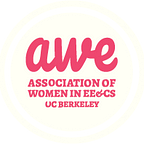An Interview with Lecturer Pamela Fox
Software engineering in the present-day, tips for the job search, & more!
You may know Pamela Fox from teaching CS 61A or CS 169, but in fact she has an extensive background in CS education prior to joining Berkeley’s EECS Department as a Lecturer. Lecturer Fox has taken on multiple roles, including being one of the first Developer Advocates at Google where she worked on the Google Maps API, and being one of the first engineers at Coursera, writing much of the initial code that powered its initial version. She also worked at Khan Academy, developing the computer programming and AP Computer Science Principles courses, and continues her engagement with CS education here at Berkeley, where the classes she teaches include those with a primary emphasis on programming, computer science education, and software engineering.
Read our full interview with Lecturer Fox below!
Q: Could we get a brief background about your journey in EE/CS?
A: I started programming from an early age, starting with web development. I went to USC for my bachelors and masters in Computer Science, and since then, I have worked at Google (as a Developer Advocate), Coursera (as a full-stack engineer), Khan Academy (as both a content creator and engineer), and Woebot (as a CTO).
Q: How do you see the field evolving ever since you first joined? Are there specific changes that you would like to see happen?
A: Software engineering is becoming increasingly collaborative. Not only do software engineers need to collaborate with other engineers, we also need to collaborate with product managers, designers, support engineers, marketing, and more. Collaborative practices and (over) communication ensures that we are working on the features and bug fixes that are most important to the product. I enjoy collaboration because of how much can be achieved and how a product can be improved by a multitude of inputs, but admittedly, I also find it difficult at times to resist the urge to just get something done quickly. As a proverb says, “If you want to go fast, go alone; if you want to go far, go together.”
We likely don’t do enough to prepare students in universities for collaborative work, since we have such an emphasis on individual grades. But you all can prepare yourself now by developing group projects together, doing internships in software companies, working together in clubs, volunteering on team efforts, etc. Your future colleagues will thank you! :)
Q: Any general advice for young women or non-binary folks interested in pursuing a career in a technical field?
A: I’ve been fortunate to generally work on teams with healthy, supportive cultures. However, there are certainly companies and teams out there that have toxic or just non-supportive cultures. Sometimes the culture issue pervades an entire company; sometimes it’s team or manager specific. When you’re looking for a job, look for signs of healthy cultures. For example, the job board on https://www.diversifytech.co/ tries to select for inclusive cultures, and GlassDoor reviews can often yield insight into cultural issues as well. When you’re interviewing, ask questions that reveal their approach to engineering. A company’s approach to testing, code reviews, and post-mortems can often reveal a lot about whether it’s a “lets blame each other” culture or a “let’s learn and grow together” culture. I have some suggested questions in this blog post on engineering culture, but you could also ask questions to probe about inclusivity issues specific to your identity, like these questions.
Follow AWE Berkeley for more!
